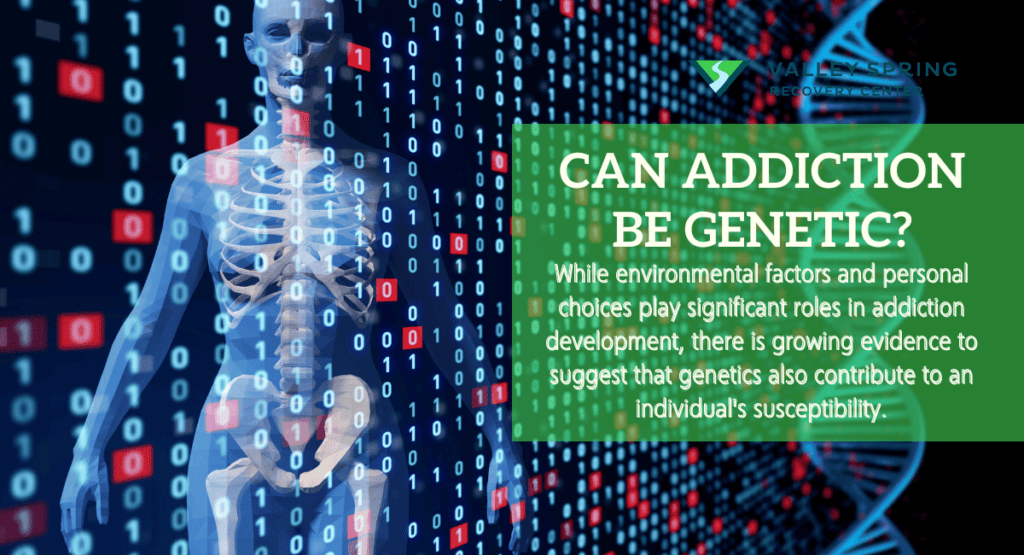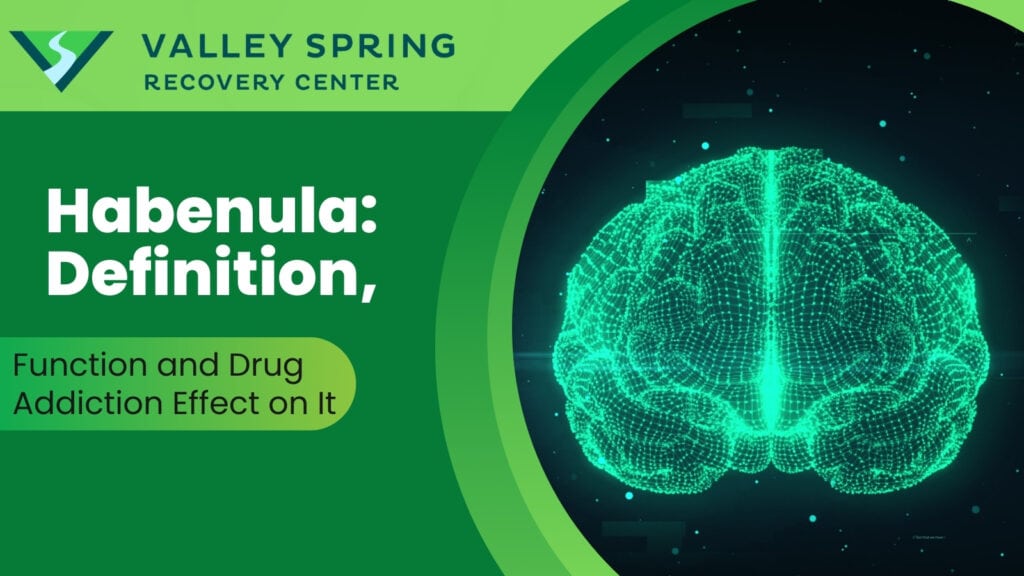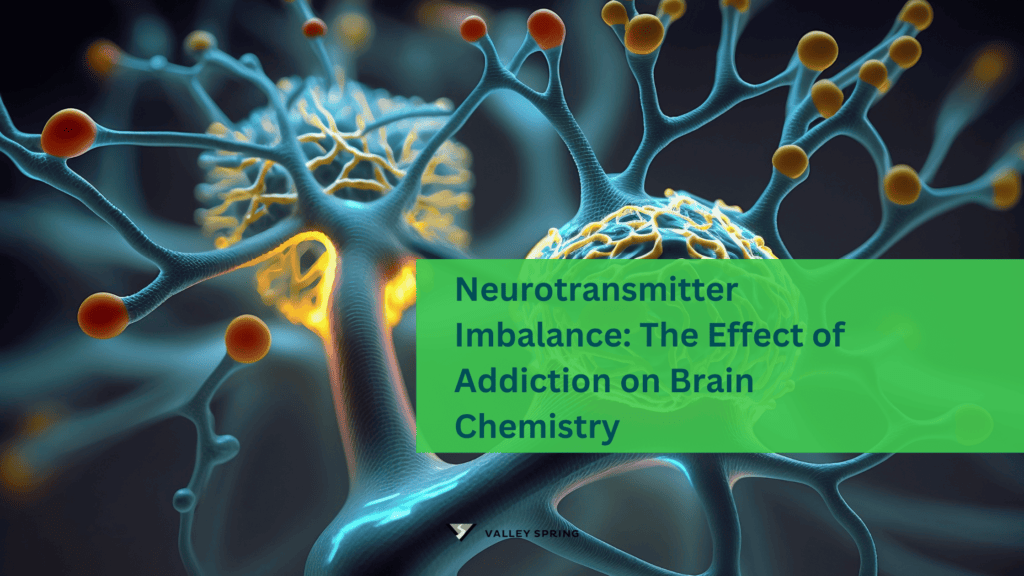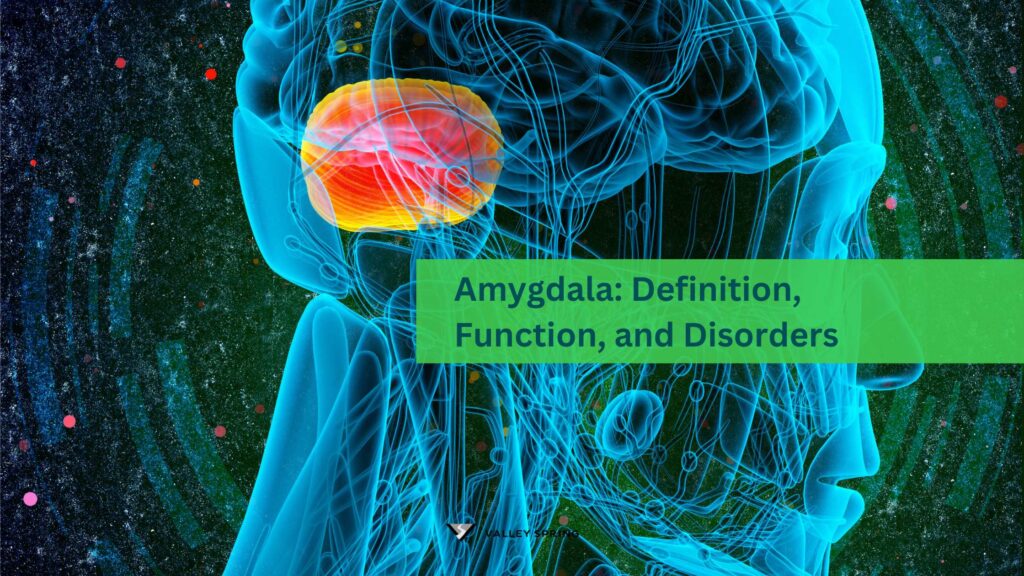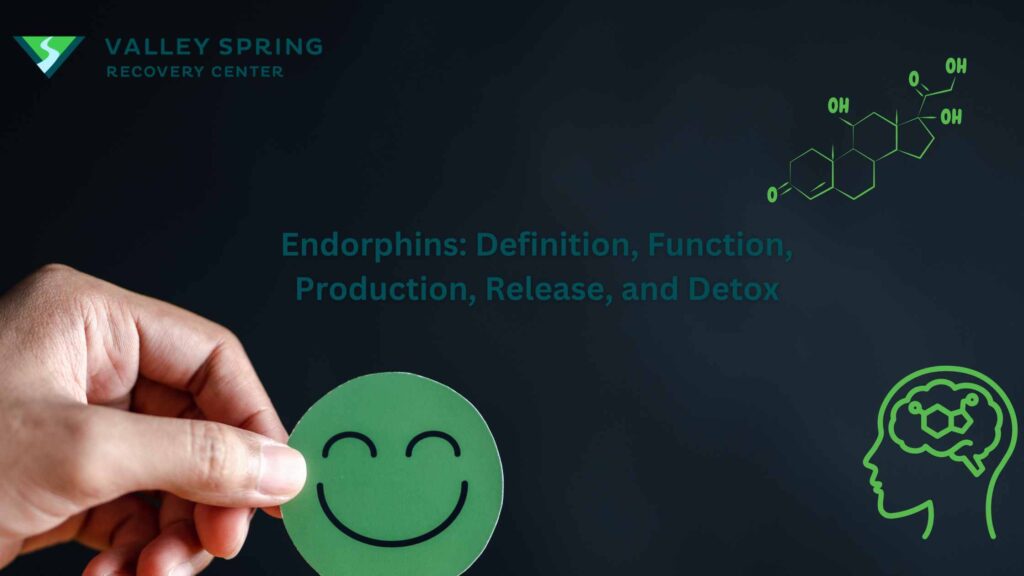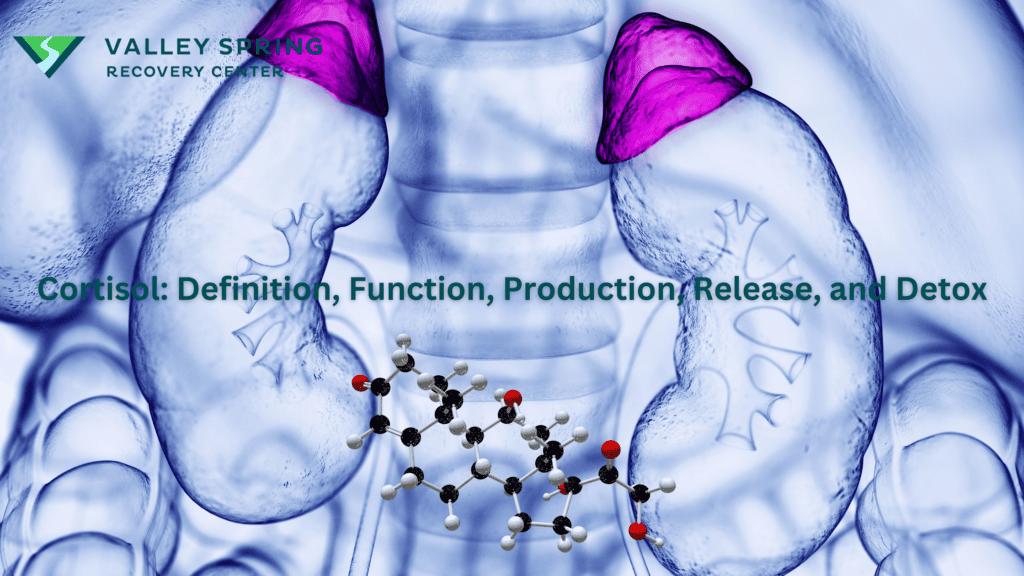The age-old debate of nature versus nurture takes a compelling turn in the realm of addiction. Groundbreaking research indicates that genetics account for approximately 40-60% of the risk for addiction, according to the National Institute on Drug Abuse. Yet, this is only part of the story. Environmental factors, ranging from family dynamics to socioeconomic status, play an equally critical role.
Genetic predisposition to addiction has been the subject of extensive research, aiming to understand the biological underpinnings and potential hereditary factors involved. Let’s explore the concept of genetic influences on addiction, and examine the current knowledge and implications for understanding and addressing this challenging condition.

This article has been enhanced with input from the Medical Director and Addiction Psychiatrist at Valley Spring Recovery Center, Dr. Michael Olla.
Check the end of each section for extra information from him.
What is the Relationship Between Genetics and Addiction?
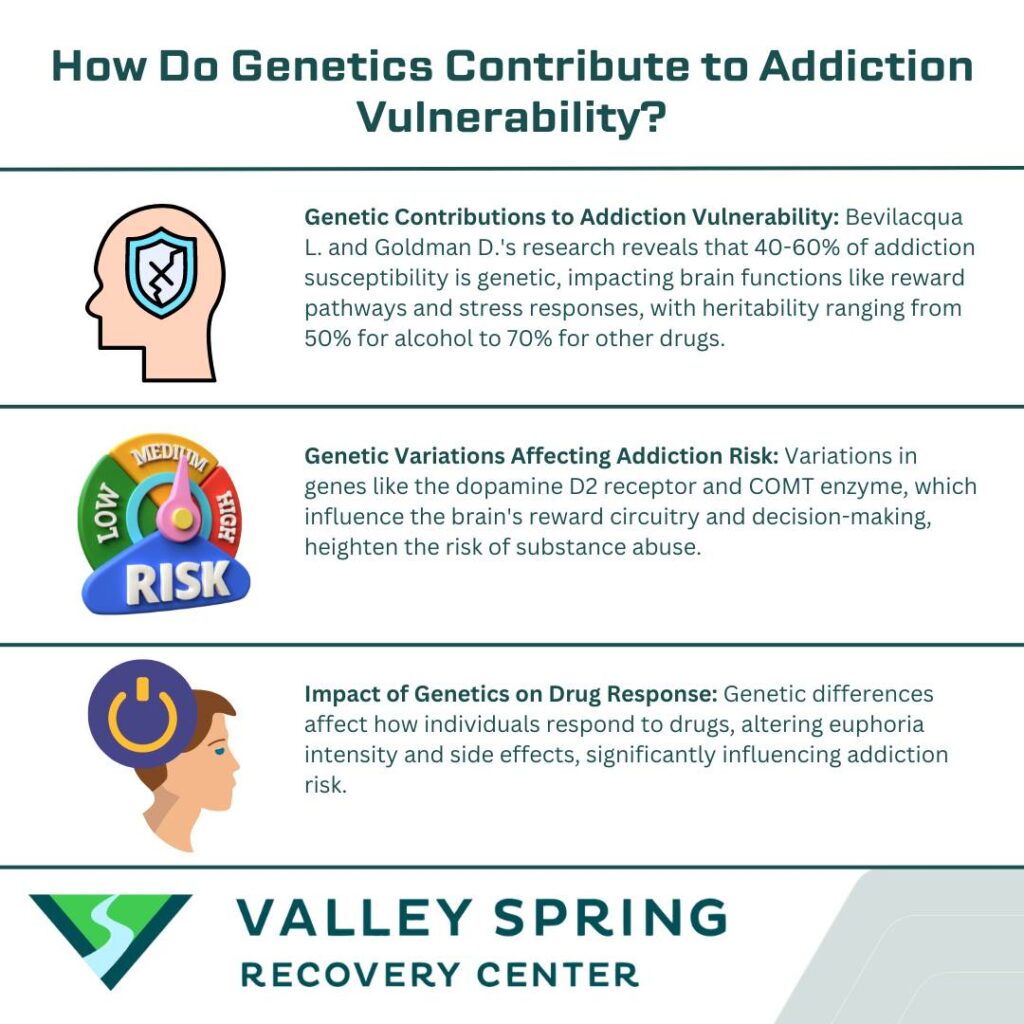
The relationship between genetics and addiction is both complex and multifaceted, involving a significant genetic component that intertwines with environmental factors to influence addiction susceptibility. Genetics alone do not determine whether a person will develop an addiction; environmental factors such as upbringing, social influences, and the availability of substances also play a crucial role.
How Do Genetics Contribute to Addiction Vulnerability?
Genetics contribute to approximately 40-60% of a person’s vulnerability to addiction Research by Bevilacqua L. and Goldman D., Genes and Addictions published in 2009. This research has identified several genes that affect an individual’s susceptibility to addiction, impacting various aspects of brain function including neurotransmitter systems, reward pathways, and stress responses.
More than half of the differences in susceptibility to substance use problems are due to genetic variations. For example, alcohol addiction is estimated to be 50 percent heritable, while addiction to other drugs can be as much as 70 percent heritable.
Danielle Dick, a Professor of Psychiatry at Robert Wood Johnson Medical School at the Rutgers Addiction Research Center (Updated April 16th 2024)
What Are The Genetic Variations Affecting Addiction Risk?
Variations in genes that encode receptors and enzymes in the brain, such as the dopamine D2 receptor, are associated with an increased risk of substance abuse. The dopamine system plays a crucial role in the brain’s reward circuitry, and alterations in this system can affect the reinforcing properties of drugs according to Blum, K et al’s 2013 study Dopamine Genetics and Function in Food and Substance Abuse.
The gene that encodes the catechol-O-methyltransferase (COMT) enzyme, which is responsible for dopamine breakdown in the prefrontal cortex—a critical area for decision-making and impulse control—has variants that have been linked to a higher risk of substance abuse and addiction.
What Is The Impact of Genetics on Drug Response?
Genetic factors can also influence how a person responds to drugs, affecting the intensity of euphoric effects or the likelihood of experiencing adverse side effects. These individual differences in drug response can significantly impact the risk of developing an addiction, making some individuals more susceptible than others based on their genetic makeup.
What Role Do Genetics and Heredity Play in Addiction?
While the terms genetics and heredity are often used interchangeably in discussions about addiction, they refer to distinct concepts that play crucial roles in the transmission of addictive traits.
- Genetics: The Role of Genes in Addiction Genetics is the study of genes and their functions. Genes, which are the basic units of heredity, are segments of DNA located on chromosomes within the human body. According to research by Eric Green, M.D., Ph.D., for the National Human Genome Research Institute updated on April 16, 2024, each person has approximately 20,000 genes arranged on 46 chromosomes, grouped into 23 pairs. These genes, inherited from both parents, dictate various physical and behavioral traits. The random assortment of genes from each parent explains the genetic diversity among siblings, despite them sharing about 50% of their genetic material, as outlined by the Centers for Disease Control and Prevention. In the context of addiction, genetics focuses on how specific genes and their variations influence an individual’s susceptibility to addictive behaviors. Certain genetic mutations may increase the risk of developing addictive disorders, highlighting the significant role of genetics in addiction.
- Heredity: Passing Traits from Parents to Children Heredity deals with how traits are passed from parents to offspring through genes. This encompasses not only the physical traits like eye color and height but also predispositions to diseases and behavioral patterns, such as addiction. Heredity explains why certain health conditions, including addiction, seem to “run” in families. It involves the transmission of genetic information that can influence an individual’s likelihood of developing addiction when exposed to suitable environmental conditions. However, heredity is not solely about genetic makeup; environmental factors also significantly shape gene expression, which can alter an individual’s vulnerability to addiction, as discussed in a 2021 update by the National Institute of General Medical Sciences.
- Interplay of Genetics and Heredity in Addiction Both genetics and heredity contribute to an individual’s risk of addiction, but they do not guarantee it. The development of an addiction is complex, involving repeated exposure to addictive substances, environmental influences, and personal experiences. While genes may set the stage for addiction, environmental factors often act as catalysts that influence whether an individual ultimately develops an addictive disorder. Research from the National Institute on Drug Abuse suggests that genetics accounts for about half of a person’s risk for addiction, indicating a substantial but not exclusive role.
Understanding the distinction and interplay between genetics and heredity is crucial in comprehending the broader picture of addiction. It sheds light on why some individuals are more susceptible to addiction than others and emphasizes the multifactorial nature of this challenging condition. This knowledge is vital for developing targeted prevention and treatment strategies considering genetic predispositions and environmental contexts.
How Can Testing Determine a Genetic Predisposition to Addiction Is Present?
Determining if someone has a genetic predisposition to addiction involves a combination of genetic testing and emerging scientific techniques that are still under development. While specific genetic tests may one day precisely identify individual risks for addiction, the field currently requires more research to fully realize this potential.
Genetic Testing and Addiction Risk Healthcare providers recognize the potential benefits of genetic testing in identifying an individual’s unique addiction risks. This testing focuses on genes related to neurotransmitter receptors in the brain and metabolic enzymes in the liver, such as cytochrome P450 (CYP) variants, which can affect how quickly a person metabolizes drugs, impacting their response to substances and medications.
Challenges in Genetic Data Utilization The interpretation of genetic data in addiction research is complicated by the diversity of data formats and software systems used across studies. To address this, the National Institutes of Health (NIH) launched the Big Data to Knowledge (BD2K) program, which aims to enhance the use of big data in scientific research and improve our understanding of genetic influences on diseases, including addiction.
Pharmacogenetics: Tailoring Treatment to Genetic Profiles Pharmacogenetics, an emerging field, aims to tailor medical treatments to the patient’s genetic profile, particularly how they metabolize medications. This approach is increasingly seen as a way to improve treatment outcomes by customizing therapeutic strategies based on genetic factors that influence individual responses to drugs.
As these technologies and methodologies develop, they offer promising avenues for better identifying and managing the genetic components of addiction, potentially leading to more personalized and effective treatment plans.
Does the Presence of Addiction in Family History Necessitate Screening?
If there’s a history of addiction in the family, it can be beneficial to undergo screening or counseling. This can help in understanding personal risks and implementing preventive measures.
Can the Effects of Addiction Be Passed Down Genetically?
While the effects of addiction per se are not directly passed down, a genetic predisposition to addiction can be inherited. This means that children of addicted parents may have a higher risk of developing addiction themselves, but it’s influenced by a combination of genetic, environmental, and personal factors.
Does Genetics Determine the Severity of Addiction?
Genetics can influence not only the risk of developing addiction but also the severity and progression of the condition. However, the severity is also affected by other factors like the type of substance, duration of use, and individual psychological and environmental factors.
How Do Genetic Factors Interact with Environmental Influences in Addiction?
Genetic factors interact with environmental influences in complex ways. For instance, someone with a genetic predisposition to addiction might never develop it without environmental triggers like stress, peer pressure, or exposure to addictive substances.
Can Understanding Genetics Help in Treating Addiction?
Understanding an individual’s genetic predisposition can help in tailoring addiction treatment. It can provide insights into potential risks, inform the choice of treatment strategies, and help in managing expectations regarding the treatment outcomes.
Are Certain Types of Addiction More Strongly Linked to Genetics like alcohol use disorder?
A study by Hicks BM, Krueger RF, Iacono WG, et al. in 2004 found an overlap between genetic influences for alcohol use disorders and illicit drug use disorders and between alcoholism and smoking. However, all forms of addiction have some level of genetic influence.
How Can Someone Overcome a Genetic Predisposition to Addiction?
Overcoming a genetic predisposition to addiction involves a combination of awareness, lifestyle choices, and possibly professional help. Avoiding triggers, maintaining a healthy lifestyle, and seeking early intervention if substance use begins are key strategies.
How Do the Effects of Addiction Impact Family Genetics?
The effects of addiction, such as health complications and behavioral changes, don’t alter family genetics. However, they can impact family dynamics and the psychological well-being of family members.
What Leads To Addiction, Genetics or Environmental Factors?

While genetics can contribute to an individual’s vulnerability to addiction, environmental factors play a significant role in determining whether those genetic predispositions translate into actual addiction.
Genetic factors provide a baseline susceptibility to addiction. Certain genes, such as those involved in brain function and reward pathways, can influence how an individual’s brain responds to substances. Genetic variations in these genes may impact factors like the release and regulation of neurotransmitters, which can affect the reinforcing properties of drugs.
However, the expression of these genetic predispositions is highly influenced by environmental factors. Environmental factors encompass a wide range of influences, including upbringing, social environment, peer influences, trauma, stress, and availability of substances.
Early life experiences and upbringing can significantly shape a person’s risk of developing addiction. Adverse childhood experiences, such as neglect, abuse, or dysfunctional family dynamics, can increase the likelihood of substance abuse later in life. The quality of parenting, family support, and the presence of positive role models can also influence an individual’s resilience to addiction.
People who are surrounded by friends or family members who engage in substance abuse are more likely to develop addictive behaviors themselves. Stressful life events, such as trauma, loss, or chronic stress, can also interact with genetic vulnerabilities to increase the risk of addiction.
Genetic factors related to stress response systems can influence how an individual copes with stress and may increase the likelihood of turning to substances as a form of self-medication or escape.
What are other Possible Risk Factors of Addiction?
In addition to genetics and environmental factors, several other risk factors can contribute to the development of addiction. These risk factors include:
1. Age of Onset
Early initiation of substance use is associated with a higher risk of developing addiction. Adolescents are particularly vulnerable due to ongoing brain development and increased susceptibility to peer influences.
2. Mental Health Disorders
Individuals with mental health conditions, such as depression, anxiety disorders, or attention-deficit/hyperactivity disorder (ADHD), have an increased risk of developing addiction. Substance use can sometimes be a form of self-medication or an attempt to cope with underlying psychological symptoms.
3. Family History
Having a family history of addiction can increase an individual’s susceptibility to developing addiction. This could be due to a combination of genetic and environmental factors passed down through generations.
4. Childhood Trauma
Adverse childhood experiences, including physical or sexual abuse, neglect, or household dysfunction, can contribute to the risk of addiction later in life. Traumatic experiences can impact brain development and increase vulnerability to addictive behaviors.
5. Peer Influence
Peer pressure and social norms that promote substance use can influence an individual’s likelihood of engaging in addictive behaviors. The influence of friends, classmates, or social groups can play a significant role, especially during adolescence.
6. Lack of Social Support
Limited social support networks or a lack of positive relationships can contribute to feelings of isolation, stress, and vulnerability to addiction. Strong social support systems and healthy relationships can serve as protective factors.
7. Easy Access to Substances
The availability and accessibility of addictive substances increase the risk of developing addiction. This includes factors such as proximity to drug markets, easy access to prescription medications, and exposure to substances in the home environment.
8. Sensation-seeking and Impulsivity
Individuals with high levels of sensation-seeking behavior or impulsivity may be more prone to seeking out novel and risky experiences, including substance use, which can increase the risk of addiction.
Note that the presence of these risk factors does not guarantee the development of addiction, and the absence of these factors does not guarantee protection from addiction. Addiction is a complex condition influenced by multiple factors, and each individual’s risk may vary.
Is Addiction More Genetic or More Environmental?
The contribution of genetics and environment to addiction is complex and multifaceted. It’s not possible to determine whether addiction is more genetic or more environmental, as both factors play significant roles and interact with each other.
It’s crucial to recognize that addiction is a complex interplay between genetics and environment. The relative contribution of each factor may vary among individuals. Some individuals may have a stronger genetic predisposition, while others may be more influenced by environmental factors. In many cases, it is the interaction between genetic vulnerabilities and environmental influences that contributes to the development of addiction.
Understanding both genetic and environmental factors is essential for comprehensive prevention and treatment strategies. By addressing both aspects, interventions can focus on reducing risk factors and enhancing protective factors to mitigate the risk of addiction and promote better outcomes.
Does Addiction Skip a Generation?
Addiction does not consistently skip a generation. Genetic predispositions to addiction can be inherited, but the pattern is complex and influenced by multiple factors including genetics, environment, and behavior. Having a family history of addiction increases the risk, but it does not guarantee addiction, and individuals without a family history can still develop addiction. Professional help should be sought for concerns about addiction or substance use.
Sources
- Genes and Addiction from the Genetics Science learning Center: https://learn.genetics.utah.edu/content/addiction/genes
- https://www.rutgers.edu/news/rutgers-researchers-delve-deep-genetics-addiction
- Bevilacqua L, Goldman D. Genes and addictions. Clin Pharmacol Ther. 2009;85(4):359-361. doi:10.1038/clpt.2009.6
- NIDA. 2021, August 3. References. Retrieved from https://nida.nih.gov/publications/drugs-brains-behavior-science-addiction/references on 2023, December 29
Dr. Michael Olla
All author postsShare This Post

